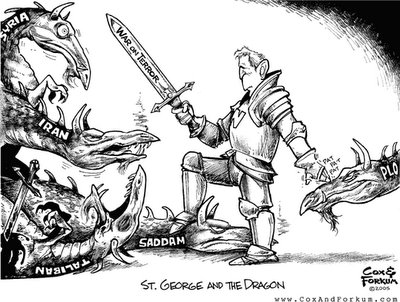By William Rivers Pitt t r u t h o u t Perspective
Friday 24 March 2006
When I walked into the headquarters of the Christine Cegelis for Congress campaign, I was immediately struck by the bustling energy in the hallways and offices. Campaign headquarters was on the third floor of a cookie-cutter building on Highland Street, a nice space with all the amenities. There was a body at every phone, groups gathered in conference rooms to pour over maps and walking sheets, and volunteers banging through the glass doors on their way to work the precincts.
The frenetic energy within campaign headquarters reflected the overall mood of the race itself. This was no ordinary primary. It had turned into a David v. Goliath brawl within the Democratic party, a challenge to see just how far a grassroots organization could carry the fight against a well-funded campaign that was supported by some of the leading lights of the Democratic establishment.
The story of the race for the Illinois 6th District House seat, which encompasses portions of both Cook County and DuPage County, shakes out like this. In 2004, Christine Cegelis, a mother of two who worked in the technology sector, challenged Henry Hyde for the seat. Hyde had been an institution in the 6th to this point, holding the seat for sixteen terms in a district that had been reliably Republican for decades. Hyde, as well as many others, were quite surprised when Cegelis managed to get 44.2% of the vote after stomping her primary opponent by nearly a 2-1 margin.
Hyde chose to retire in 2005, making the Illinois 6th an open seat for the first time since the Carter administration. The work done by the Cegelis campaign in 2004 essentially established, for the first time in a long time, a serious Democratic presence in the district. Cegelis chose to continue campaigning even after the '04 election, and had been working ever since towards a run in 2006. She had established a ground game and name recognition among the constituents she hoped to represent, and based her campaign on the need to bring jobs back to the area.
Enter Rahm Emmanuel and the Democratic Congressional Campaign Committee. Emmanuel, himself a congressman from a neighboring district, has been a kingmaker with the DCCC as chairman. He saw the open seat in the 6th as an excellent opportunity to cut into the GOP majority in the House, and made the race for that seat a central priority of the DCCC. For whatever reasons, however, Emmanuel chose to ignore Christine Cegelis and the work she had done, and instead endeavored to pull a different candidate into the race.
Emmanuel spent eleven months searching for an alternative to Cegelis. He started with an Illinois state senator, who turned Emmanuel down for personal reasons. He next approached Peter O'Malley, a lawyer who works with the Illinois Mediation Service. O'Malley got into the race, but finding his campaign unable to raise any money to challenge Cegelis, dropped out in the summer. Emmanuel next approached Brian McPartlin, Chief of Administration of the Illinois State Toll Highway Authority, who did not want to leave his job and turned the offer down. A local businesswoman was approached after McPartlin refused the job, but the campaign never materialized. It appeared, for a time, that Christine Cegelis was going to weather this inter-party storm and stand as the candidate.
After a long and fruitless search, Emmanuel finally located a candidate willing to challenge Cegelis. Tammy Duckworth was an Army Major and an Iraq War veteran who had lost both legs when her helicopter was attacked. Duckworth was not a resident of the district, and has a voting record that is only two years old. Emmanuel and the DCCC, however, believed her status as a veteran would be a boon to fundraising efforts, and would be attractive to moderates and conservatives who swoon over anyone who has worn a uniform. The running of Iraq veterans is a DCCC plan being enacted in a variety of other districts across the country.
During Emmanuel's long search, a third candidate for the Democratic primary in the 6th district emerged. Lindy Scott, an evangelican Christian college professor, jumped into the race with the belief that he could bring religiously-oriented voters back into the party. Throughout the primary, Scott polled in the low teens, but would wind up having a significant effect on the overall outcome.
The Cegelis campaign, meanwhile, was sailing through rough waters of its own. The campaign manager managed to spend $250,000 on nothing, putting the campaign into a deep financial hole. The ground network established since 2004 was left fallow. Six weeks before the primary, Cegelis fired her campaign manager, along with virtually her entire staff, and brought in a man named Kevin Spidel. Spidel, who was at the time serving as Deputy National Director for Progressive Democrats of America, took a leave of absence from PDA to take over as campaign manager. He organized a whole new staff, took a look at the money they had on hand, and engineered a whole new plan based on the ground network that had once been the main strength of Cegelis' run.
The challenge was daunting. Emmanuel brought in Senators Durbin, Obama and Kerry, along with a variety of other leading lights, to do vigorous fundraising for Duckworth. He reached out to David Axelrod, a powerful campaign and media consultant in Chicago, to help with a media blitz. By the end of the campaign, the Duckworth crew had sent eleven different pieces of direct mail to voters in the district, covered the airwaves with commercials, and had spent close to $1,000,000.
The Cegelis crew, however, was not interested in quitting. First of all, their candidate's stand on a variety of local and national issues was far clearer than those of Duckworth, especially on the issue of the Iraq occupation. They believed their candidate to be more than a match for the GOP opponent they would face in November, a far-right DeLay clone named Peter Roskam.
More than anything, however, was a sense of outrage directed at Emmanuel, the DCCC and the Democratic party establishment in general. Where did they get off bringing in an outsider with no local support? Where did they get off trying to poach the hard work Cegelis had done over the previous two years to establish a Democratic presence in a district that had not known of such a thing for decades? All the money in the world, and all the endorsements from Democratic worthies, could not change the essence of their beliefs.
And so, last Tuesday, the primary to determine the Democratic challenger for the 6th District went down. Cegelis lead by a whisker throughout the night, until the results from Cook County began trickling in. The campaign had expected to do poorly in Cook, and their expectations were met. By the time the clock wound past midnight, the slim advantage Cegelis had enjoyed in DuPage County also began to bleed away. Thanks to the mayhem that took place in Cook County's election stations that night, a winner in the race for the 6th was not declared until the wee hours of the morning. It was Duckworth by a nose.
The final numbers are telling. Duckworth got 43.8% of the vote to Cegelis' 40.4%. The margin of victory for Duckworth was exactly 1080 votes. The 6th District has 512 precincts, which means Duckworth's margin of victory was 2.1 votes per district. Given the fact that her campaign spent nearly a million dollars to win this race, the price tag on those 2.1 votes per district is staggering.
It was that close. Had Spidel been brought in a few weeks earlier, and had the previous campaign manager not spent a quarter of a million dollars worth of campaign funds on shadows and dust, the outcome probably would have been much different. The Lindy Scott factor likewise cannot be ignored. In the end, he got nearly 8,000 votes, amounting to somewhere around 16%. It is telling, when thinking of Scott, to see the blog post he made days before the election, in which he bragged that a majority of the votes he expected to get would come from erstwhile Cegelis voters.
The "If" factor cannot alter the outcome, but there is a significant lesson for the Democratic party establishment to learn here. Tammy Duckworth, Rahm Emmanuel, the DCCC and all those big-time endorsers got brought down to the wire by a grassroots campaign with a tenth of the money, and in the end came within an eyelash of losing. Conventional wisdom says Cegelis should not have made it that close. She didn't have the cash, the endorsers, or the media team Duckworth had. It should have been an easy win, but it wasn't.
The next time the Democratic establishment decides to come barnstorming into a district to force an outsider candidate upon a grassroots network that has been working day and night for an already-established and campaign-seasoned candidate, they will look at what happened in the Illinois 6th and, perhaps, think twice. The next time a grassroots organization in a district looks at a big-money primary challenger and sees no chance to succeed, they will look at the Illinois 6th and, perhaps, think twice.
In the meantime, many Cegelis supporters have begun the process of swallowing the bitterness of defeat in order to organize for the defeat of Peter Roskam. They do this not because they suddenly like Tammy Duckworth, but because of the larger issues at hand. Kevin Spidel noted in the aftermath of the election that the point is not to elect Duckworth in November simply for the sake of electing Duckworth. The point is to win the November race in order to take one step closer to ending the Republican majority in the House of Representatives.
The point, Spidel will tell you, is to see Rep. John Conyers Jr. sitting as chairman of the House Judiciary Committee when all is said and done.
That, Spidel says, is the worthiest and most progressive-minded goal he could possibly imagine.
William Rivers Pitt is a New York Times and internationally bestselling author of two books:
War on Iraq: What Team Bush Doesn't Want You to Know and
The Greatest Sedition Is Silence.
Link Here





































